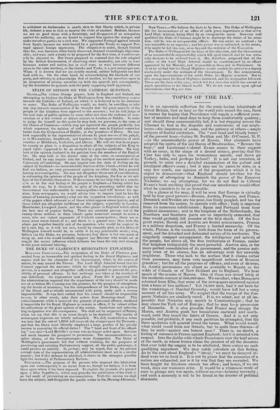STATE OF OPINION ON THE CATHOLIC QUESTION.
GLOBE—The violent Orange papers, both in England and Ireland. are attempting to frighten the Duke of Wellington from the conciliatoty course towards the Catholics of Ireland, on which it is believed to be his intention to enter. The Duke of Wellington would, no doubt, he unwilling to take
any step towards emancipation if he thought that the e majority of the people of the kingdom WCF0 opposed to the measure ; bet he will judge of the real state of public opinion by some other test than the violence of asse- veration of a few writers or dinner orators in London or Dublin. In order to judge for himself on this point he May look, we presume, to the votes of the House of Commons—which may not represent the people perfectly, but which represent the opinion of well educated men in England somewhat better than the Corporation of Dublin, or the 'prentices of Derry. He may look especially to the representatives chosen by great mas,ses of the pebple, as in Westminster, Southwark, and London—to the representatives of such counties as Middlesex, Yorkshire, and Devon. He will see that in no popu- lar county or place is a disposition to admit all the subjects of the King to equal rights supposed to be an obstacle to a popular candidate. He may look at the opinion declared in the petition from the members of the English bar. He may look at the altered state of the votes on emancipation at Oxford, and he may inquire into the feeling of the resident members of the University of Cambridge. He may inquire into the state of feeling on the subject in Scotland—no inconsiderable fraction of this island—where Ile will find, we believe, no very pronounced opinion on either side, but a general leaning to entancipatiou. He may not altogether throw out of consideration, in estimating the opinions of the people of the kingdom, the five or six mil- lions of the Catholics themselves. If these means do not help him to a conclu- s:5n as to the real feeling of the people in England—a feeling which has made its way, be it observed in spite of the prevailing belief that the Government was unfavourable to emancipation—and will borrow his opi- nions from newspapers, we would advise him to inquire (and he hat the means of knowing- accurately) what are the respective circulations, as welt of the papers which advocate as of those which oppose emancipation, and of those which are altogether indifferent on the subject, especially in London, Manchester, Liverpool, Leeds, and the other places in England which afford the best test of popular feeling. There are certainly persons out of the twenty-three millions in these islands quite numerous enough to make a noise, who are violent opponents of Catholic emancipation ; there are as many more warm friends of it ; and there is a greater mass than both the others put together heartily sick of the question, who would be content to Jet it rest, but, as it will not rest, would be sincerely glad, as the Duke of Wellington himself would be, to settle it by any practicable mode ; who, believe (as the Duke, we presume, believes) that there is but one mode of doing so and who would cordially support any Minister who would set at nought the secret influence which hitherto has been the only real obstacle to this great national blessing.


















 Previous page
Previous page